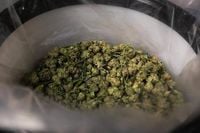President Donald Trump has thrust the debate over marijuana reform back into the national spotlight, confirming at a White House news conference on August 11, 2025, that his administration is actively considering whether to reclassify cannabis under federal law. The move, if it happens, would mark a significant shift in U.S. drug policy and could have sweeping implications for medical research, the cannabis industry, and the broader culture wars gripping the nation.
"We're looking at reclassification and we'll make a determination over the next -- I would say over the next few weeks, and that determination hopefully will be the right one. It's a very complicated subject," Trump told reporters, as quoted by multiple outlets including The Wall Street Journal and Axios. The president's comments came during a briefing that also addressed a federal takeover of Washington, D.C.'s police force and the deployment of the National Guard to address crime and homelessness in the city—a context that prompted questions about whether marijuana reform might send mixed signals about the administration's law-and-order agenda.
Marijuana is currently classified as a Schedule I drug under the Controlled Substances Act, placing it in the same category as heroin and LSD—substances defined as having "no currently accepted medical use and a high potential for abuse." This classification has long hindered medical research and imposed steep tax burdens on the legal cannabis industry. By contrast, Schedule III drugs, such as ketamine, anabolic steroids, and testosterone, are considered to have a "moderate to low potential for physical and psychological dependence," and their reclassification would open new doors for scientific study and industry growth.
The push to reconsider marijuana's status did not begin with Trump. During the final year of the Biden administration, the U.S. Department of Health and Human Services recommended that the Drug Enforcement Administration (DEA) reclassify cannabis from Schedule I to Schedule III. That recommendation followed the Biden administration's decision in late 2022 to initiate a formal regulatory review of cannabis's federal classification—the fifth such petition in U.S. history, but notably the first led by the White House itself, as reported by NORML and other advocacy groups.
Hearings on the matter were scheduled for early 2025, but they were abruptly stayed after allegations surfaced that the DEA had engaged in inappropriate and biased conduct, raising questions about the fairness of the process. Since January, there has been no further official movement, leaving the future of federal marijuana policy in limbo.
Trump's remarks this week represent his first public statements on cannabis policy since returning to the White House. He struck a cautious, somewhat ambivalent tone, acknowledging the complexity of the issue and the range of opinions swirling around it. "I've heard great things having to do with medical, and I've had bad things having to do with just about everything else. But medical, and, you know, for pain and various things," Trump said. "Some people like it, some people hate it." He added that his administration would "make a determination over the next few weeks."
The president's stance appears to be informed by both political calculation and personal skepticism. In a September 2024 post on Truth Social, Trump wrote, "As President, we will continue to focus on research to unlock the medical uses of marijuana to a Schedule 3 drug, and work with Congress to pass common sense laws, including SAFE banking for state authorized companies, and supporting states’ rights to pass marijuana laws."
Yet, the prospect of federal reform has ignited fierce debate within Trump's own political base, particularly among prominent MAGA (Make America Great Again) figures. According to Axios, leading MAGA voices have warned that reclassifying marijuana could open the floodgates to what they describe as a "pothead" culture, undermining the values of hard work and traditional masculinity that the movement champions. Matt Walsh of The Daily Wire was blunt: "No country of potheads has ever thrived, or ever achieved anything at all. Every city that legalized it became an even bigger sh*thole basically overnight."
Jack Posobiec, a MAGA-aligned podcaster, echoed these concerns, saying, "America deserves better, our kids deserve better, I don't want to have to be smelling weed anytime I take my kids anywhere in a city or a national park." The rhetoric taps into a broader cultural narrative that casts marijuana as emblematic of liberal permissiveness and societal decline—contrasted with the "whiskey-and-cigar" traditions of a bygone, more disciplined era.
Some MAGA-aligned commentators have gone further, framing the issue as a battle over virtue, meritocracy, and the very character of Western civilization. As podcaster Michael Knowles told Axios, "We're all for cultivating virtue, either stoic or Christian, but it doesn't mean we don't like pleasure. It's just that we prefer traditional pleasures. The left is more comfortable just kind of vegging out, but they should not be, because sloth is bad for the individual and for society."
However, not all within the MAGA movement are opposed to reform. The movement's libertarian streak and skepticism of Big Pharma have led some to support reclassification, especially as a way to expand access to nontraditional treatments for conditions like PTSD. MAGA influencer Rogan O'Handley argued, "Rescheduling marijuana doesn't legalize it, but it does allow for more medical research," and suggested that it would challenge "Big Pharma" and "Big Prison." CJ Pearson, another MAGA voice, said that Trump's "openness to rescheduling is research driven and shows he's listening to the countless veterans whose lives have been changed for the better by its medicinal benefits."
The legal cannabis industry, for its part, is watching closely. Reclassifying marijuana to Schedule III would not only spur research but also allow cannabis businesses to claim federal tax deductions currently denied to them, providing a significant financial boost. The industry has reportedly donated millions to Trump's political groups, according to Axios, adding another layer of intrigue to the policy debate.
Despite the cultural and political crosscurrents, the scientific and economic arguments for reform remain compelling to many. Advocates point out that the current Schedule I classification is out of step with both medical evidence and the patchwork of state laws that have legalized marijuana for medical or recreational use in much of the country. NORML and other groups continue to submit public comments and push for change, emphasizing the need for a rational, evidence-based approach.
As the nation awaits the Trump administration's decision, the debate over marijuana policy has become a microcosm of the larger tensions shaping American society—between tradition and change, order and liberty, old fears and new possibilities. Whether the next few weeks will bring clarity or simply more controversy remains to be seen, but one thing is certain: the conversation is far from over.


